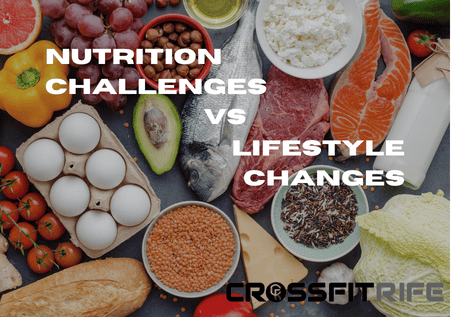Unpopular opinion, nutrition challenges don’t work.
The idea behind these programs is that if you can see the changes in your body from week-to-week then it will motivate you to continue on with the program. The main problem with these challenges is that they don’t teach people how to make lasting lifestyle changes. They don’t address why people are eating too much or what triggers them to overeat when they do eat too much (which often happens when we’re stressed out).
Here’s why they don’t work:
- Lack of sustainability. If you’re trying to lose weight, it’s important that your diet be sustainable for the long term. A nutrition challenge is not sustainable because it requires too much restriction and doesn’t take into account individual needs–it’s one size fits all!
- Too restrictive. Restricting yourself from certain foods can be counterproductive in terms of weight loss and overall health; it also makes you feel deprived which leads to binge eating later on down the road (or even worse).
- Not tailored to individual needs. The problem with most diets out there today is that they don’t consider individual differences such as age, gender or even medical history when creating them; this means that some people will do better than others with certain types of food plans while others may struggle more than necessary simply because they weren’t given options suited specifically towards their bodies’ needs.”
The Benefits of a Lifestyle Change
Lifestyle changes are more sustainable than challenges because they’re focused on long-term success. They also allow you to personalize the plan for your needs, which makes it easier for you to stick with it.
For example, if you hate eating vegetables but love fruits and grains, then a diet plan that focuses on those foods will work better for your lifestyle than one that requires strict adherence to a specific regimen of vegetables every day (or even every meal).
Tips for Making a Lifestyle Change
- Set realistic goals. If you’re trying to lose weight and have a lot of weight to lose, it’s tempting to set a goal that seems too far out of reach. If you want to lose 20 pounds in three months, for example, that might be unrealistic–and setting yourself up for failure. Instead of aiming so high that you’ll feel like giving up when things don’t go according to plan (or even if they do), aim for smaller goals along the way: losing 2 pounds per week or 5% body fat over six months are both achievable targets!
- Start small and build up from there. It’s also important not just what your ultimate goal is but how quickly you get there; if your nutrition challenge involves eating more vegetables every day at first but then increasing their quantity later on once it becomes easier for you (and thus less challenging), then that’s fine too! The key is making sure each step along the way feels manageable so as not only keep motivated but also avoid burnout by keeping things interesting enough throughout all stages without feeling overwhelmed by either tasks involved with making lifestyle changes (like figuring out recipes) or having too much freedom about what choices we make ourselves
How to Develop Healthy Eating Habits
Join a program with me and you’ll have this down in a few weeks.
How to Stay Motivated
Set achievable goals. If you’re trying to lose 10 pounds, don’t set a goal of losing 20 pounds in two weeks. You will fail and feel defeated before you even get started. Setting realistic goals will help keep your motivation high and make the process less daunting.
Reward yourself for reaching milestones along the way (like losing 5 pounds). This can be as simple as buying yourself a new pair of jeans or treating yourself to dinner at your favorite restaurant!
Surround yourself with positive people who support your healthy lifestyle choices–and avoid those who don’t!
How to Overcome Challenges
The first step to overcoming challenges is identifying the triggers.
What are the situations that make you feel like giving up? Are they related to your diet, such as eating out with friends or going to a party where there will be food? Or do they have nothing to do with food, like being too busy at work or having an argument with someone close to you? Once you’ve identified your triggers, it’s time for step two: developing coping strategies.
Step two involves developing coping strategies–ways of dealing with those situations so that they don’t trigger unhealthy behaviors in the future.
For example, if going out for dinner makes me think about overeating and feeling guilty afterward (trigger), then I need a strategy for dealing with this problem without sabotaging my weight loss efforts (coping).
One option would be bringing my own healthy meal from home; another might be asking my server not to bring any breadsticks until after everyone else has ordered their meals; still another could include asking one friend who doesn’t order appetizers instead of everyone else at our table so there won’t be temptation all around us!
So, what is the takeaway here?
Nutrition challenges don’t work. They’re short-term solutions that can lead to long-term problems if you don’t have a plan for what happens after the challenge is over. A better approach is making a lifestyle change–a permanent change in how you eat and live–and sticking with it!
If you want to make a successful lifestyle change, here are some tips:
Set realistic goals for yourself (e.g., “I want to lose 10 pounds by my birthday” vs “I’m going on an all-juice fast until I’m skinny enough for my wedding dress”).
Stay motivated by keeping track of your progress and celebrating each milestone along the way (e.g., when I lose 1 pound). If something isn’t working out as planned (e.,g., I gained back 5 pounds), adjust accordingly so that your goal stays within reach!
Ready to make lasting changes?
Check out our nutrition services and get inside a program today.
Brit Bailey, MSNHP, RDN, LDN






